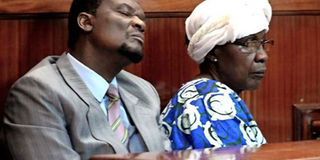War on graft still skewed as it is tainted by political factors

Sirisia MP John Waluke and business partner Grace Wakhungu in a Nairobi court on January 29. PHOTO | FILE | NATION MEDIA GROUP
What you need to know:
- The jaw-dropping Sh1 billion fine each and cumulative jail terms of nearly 70 years in default sent a collective gasp across the country.
Many opined that the severe sentences for the first time in Kenya established that crime does not pay.
Deputy President William Ruto’s office used to be the natural port of call for all corruption suspects seeking political cover. Now, former Prime Minister Raila Odinga seems to have become the go-to person, earning his office the unflattering moniker of ‘laundry’ or ‘sanitiser’.
Two episodes of high drama last week captivated the nation and also exposed the schisms that lend political and ethnic dimensions even to what should be straightforward matters of law and justice.
First was the June 25 corruption sentence on Sirisia MP John Waluke and high-society businesswoman Grace Wakhungu. The following day, it was the Senate verdict on Kirinyaga Governor Anne Waiguru’s impeachment motion.
MAXIMUM ATTENTION
Both processes generated maximum attention, including live TV coverage, acres of newsprint and all the usual analyses and commentaries. They also provided fodder for endless discussion and debate on WhatsApp groups, Twitter, Facebook and the physical spaces still available in these times of Covid-19.
What came out in many instances is that, even without going into the details of the findings of the Magistrate’s Court and the Senate, many of us reached our own verdict based on nothing but our tribal (I use the objectionable term deliberately) lenses and political leanings.
Let us start with the Wakule-Wakhungu case. The jaw-dropping Sh1 billion fine each and cumulative jail terms of nearly 70 years in default sent a collective gasp across the country. Newspaper headlines and breathless commentaries hailed the penalties as the greatest gain ever witnessed in the fight against corruption. Many opined that the severe sentences for the first time in Kenya established that crime does not pay.
HIGH-PROFILE ARRESTS
The sentences were a landmark, indeed, for citizens tired of the drama that usually accompanies high-profile arrests followed by the anti-climax of long-drawn out cases and low-key acquittals. Kenyans were already inured to sterile wars against corruption that brought more bark than bite since President Daniel arap Moi, in 1997, established the original Kenya Anti-Corruption Authority — the precursor of the Ethics and Anti-Corruption Commission (EACC)— under maverick businessmen John Harun Mwau.
The sentences meted out on Waluke and Wakhungu were hailed as the indication that the investigative and prosecutorial agencies were finally getting their act together and presenting cases that the courts could not reject on the normal flimsy and suspect grounds.
But not everyone was impressed. Yours Truly, for one, took a dim view of the fact that the sentences did not include mandatory jail terms. The accused will not have to subsist on the prison diet of beans-garnished weevils if they can raise the fines. The poor have no option but rot in jail.
Then there were those who felt the sentences were just part of the usual PR gimmickry, destined to be reversed at the High Court or Court of Appeal as so often happens.
Finally, there were the ethno-political lenses. Many commentators insisted that the duo was punished because they did not hail from the ‘right’ part of the country or were not on the ‘approved’ side of the political divide. They pointed to Ms Waiguru’s Senate acquittal the following day as an indication that those play their political cards, ethnic affiliations and personal relationships right will always walk.
It is, indeed, true that the Waiguru case, from inception in the Kirinyaga County Assembly, was heavily coloured by politics. Coming into play was the big fight on the national scene around the 2022 Uhuru Succession, where Dr Ruto is up against the alliance of the President and Mr Odinga.
Ms Waiguru was pushed out as a Cabinet secretary in 2015 over the National Youth Service (NYS) scandal because of the pressure applied by the Odinga brigade but bounced back as a governor in 2017.
MENDED FENCES
After the Uhuru-Raila post-election rapprochement, she mended fences with the latter and, soon enough, was one of the prominent central Kenya figures making pilgrimages to his Capitol Hill offices.
It was no secret that in the run-up to the Senate hearings she was actively courting the support of Mr Odinga’s ODM troops as well as President Kenyatta’s ‘Kieleweke’ faction of the ruling Jubilee Party.
Preliminary skirmishes in the Senate clearly showed the divide between Kieleweke and the Tangatanga grouping loyal to the Dr Ruto. Victory for Kieleweke at that stage made the special committee hearings a mere formality.
Still, anybody who paid close attention to the hearings would concede that very little evidence was brought directly implicating her in corrupt activities or other impeachable offenses. But still, the facts don’t matter when politics takes centre stage.
[email protected] gaitho.co.ke @MachariaGaitho





